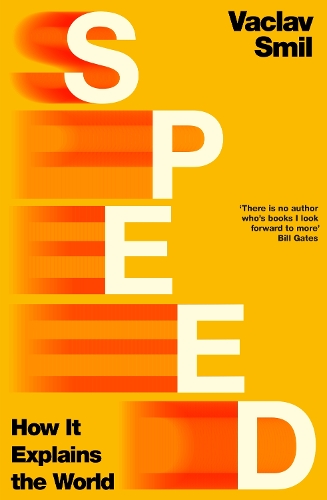
Speed: How it Explains the World
(Paperback)
Publishing Details
Speed: How it Explains the World
By (Author) Vaclav Smil
Penguin Books Ltd
Viking
2nd December 2025
27th November 2025
United Kingdom
Classifications
General
Non Fiction
Interdisciplinary studies
Scientific standards, measurement etc
Probability and statistics
Popular beliefs
Human biology
Mathematical modelling
History: specific events and topics
Physical Properties
Paperback
352
Width 153mm, Height 234mm, Spine 40mm
700g
Description
Prepare to view the world through a new lens - SPEED - a groundbreaking exploration that challenges your perceptions of life's driving force, from the internationally bestselling author Explore how speed influences every aspect of life on Earth, from the slow grind of geological processes and the fleeting lifespans of organisms to the astonishing speed of light and the remarkable adaptations of creatures like the swift antelope and the soaring albatross. In this ambitious and wide-ranging ideas book, internationally bestselling author Vaclav Smil uncovers the intricate connections between speed, nature, and human innovation. With counterintuitive insights, such as how erosion actually accelerates mountain growth, Smil challenges long-held myths. For example, Smil debunks the notion that our modern lives are accelerating at an unprecedented pace- the rapid adoption of mobile phones - from 0% in 1983 to 90% in 2002 (19 years) - is like the spread of earlier technologies such as radio (22 years), colour television (24 years) and even microwave ovens (17 years). In SPEED, Smil combines his trademark compelling statistics with insightful analysis to take readers on a captivating journey through the vast timescales of Earth's history and the complexities of modern life. He explains how we measure speed and reveals the theoretical limits that shape our societies, offering a thought-provoking exploration of the forces that define our world. This eye-opening book encourages readers to see speed's vital role in everything around us.
Author Bio
Vaclav Smil is Distinguished Professor Emeritus at the University of Manitoba. He is the author of over forty books on topics including energy, environmental and population change, food production and nutrition, technical innovation, risk assessment, and public policy. No other living scientist has had more books (on a wide variety of topics) reviewed in Nature. A Fellow of the Royal Society of Canada, in 2010 he was named by Foreign Policy as one of the Top 100 Global Thinkers.
